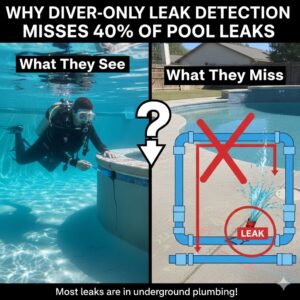Why Diver-Only Leak Detection Misses 40% of Pool Leaks
Diver-only pool leak detection sounds convenient, but for many New Jersey homeowners in Monmouth, Ocean, Middlesex, and Mercer County, it ends in frustration. A diver swims around, looks at the liner, checks a few fittings, and then gives you a quick answer. The problem is simple: they can only see what is inside the pool shell — not what is happening underground in the plumbing, concrete, or soil.
In reality, a huge percentage of leaks start in the underground pipes, skimmer lines, main drains, and hidden fittings that a diver can’t see or reach. That is why diver-only methods routinely miss leaks, forcing homeowners to keep refilling the pool, wasting water, and eventually paying again for real, equipment-based testing.
What Divers Can See — and What They Can’t
A diver can be useful for checking visible tears in a vinyl liner, obvious cracks in a plaster shell, or loose fittings that are clearly leaking. But most leaks are sneaky. In towns like Freehold, Toms River, East Brunswick, and Hamilton, many pools were built decades ago. Over time, shifting soil, freeze–thaw cycles, and aging PVC cause underground pipe leaks that do not show up as an obvious hole inside the pool.
Because divers are usually not equipped with pressure testing rigs, tracer tone equipment, or geophones, they have no way to confirm whether the plumbing lines are actually holding pressure. They may pronounce the pool “fine” even though water is quietly escaping through a cracked return line under your patio.
Real Leak Detection Uses Instruments, Not Guesswork
Real leak detection companies serving Monmouth, Ocean, Middlesex, and Mercer County rely on measurable tests instead of guesses. These tests include pressure testing, line isolation, acoustic listening, electronic locating, and sometimes video inspection. With this approach, each line is sealed off, pressurized, and monitored. If it cannot hold pressure, the technician knows there is a leak in that section of pipe.
This kind of methodical process is how skilled leak detection specialists find the leaks that divers miss. They do not need to guess based on a quick swim; they can prove exactly which line is leaking and often pinpoint the approximate location of the break before any digging or cutting begins.
Why Diver-Only Inspections Cost You More
At first, a diver-only visit might look cheaper. However, when the diver tells you there is no leak or blames a small patchable spot while the real problem is underground, you are left with a leaking pool, a higher water bill, and no real answers. Homeowners in places like Marlboro, Brick, Old Bridge, and Princeton often end up paying twice — once for the diver and again for a real leak detection company with the right tools.
Meanwhile, that hidden underground leak can undermine decks, wash out soil, and damage concrete. The longer it is left undiagnosed, the more expensive the repair can become. Diver-only inspections do not protect your investment; they delay proper testing.
Choose Real Leak Detection in Central New Jersey
If your pool is in Monmouth, Ocean, Middlesex, or Mercer County and you suspect a leak, think beyond the diver. Ask any company you contact what kind of equipment-based tests they use. Do they pressure test each line? Do they use acoustic listening devices? Can they provide a written report of their findings?
When you insist on real leak detection instead of diver-only guesswork, you give yourself the best chance of finding the true source of the problem the first time. You save water, protect your backyard, and avoid paying over and over for missed leaks. That is the heart of the Ditch The Diver message: stop relying on fins and start trusting proven methods.

